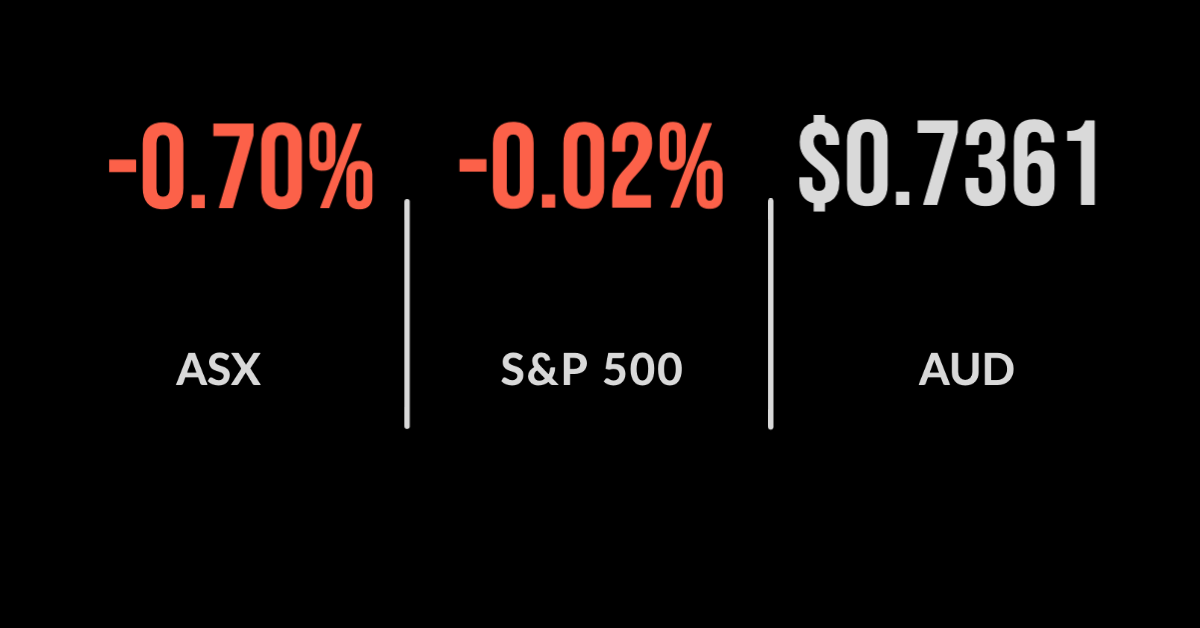ASX fades from highs as miners hit reverse
Markets drift lower, Rio’s dividend bonanza, inflation spikes
The ASX 200 (ASX: XJO) weakened throughout the session, ultimately finishing 0.7% lower on Wednesday.
Every sector fell apart from property, which added 0.9%, with the local tech sector once again the hardest hit, down 2.1% as Afterpay Ltd (ASX: APT) and Zip Co Ltd (ASX: Z1P) continue to face global competition.
Both Vicinity Centres (ASX: VCX) and Scentre Group (ASX: SCG) rallied over 2% after lockdowns ended and the Victorian Government released another round of business and landlord support.
All eyes were on the mining sector with Rio Tinto (ASX: RIO) reporting its FY21 result after the market closed, delivering what can only be described as a dividend bonanza.
The company announced a 262% increase in its dividend to US$5.61 per share, totalling US$3.76 billion being returned to shareholders.
In a smart move, management split the dividend into an ordinary payment of US$3.76 and a special dividend of US$1.85 to ensure expectations of future payments aren’t at this level.
Rio Tinto shares outperformed the market on Wednesday, falling just 0.2% as management also announced a $2.4 billion investment into a Serbian lithium project as it seeks to capitalise on battery demand for the economy.
BHP outbids Twiggy, Spark offer increased, inflation hits 13 year high
Staying with commodities, BHP Group Ltd (ASX: BHP) fell 1.7% despite announcing its decision to acquire Canadian nickel, copper, and platinum miner Noront Resources Ltd (CVE: NOT).
The company had received a bid from Twiggy Forrest’s Wyloo Metals in May and represents another pivot to secure a future in the battery metal sector with nickel in particular set to see massive demand in the next decade.
Private equity firm KKR increased its offer for Spark Infrastructure Group (ASX: SKI) to $2.95 per share, sending the share price 5.4% higher but still at just $2.74.
The offer represents a 26% premium but in my view, investors best hold on until the share price trades closer to $2.95.
Australia has followed the rest of the world with inflation rising to 3.8% in the 12 months to June, 0.8% of which came in the preceding quarter.
It is abundantly clear that this is transitory inflation, caused primarily by the base or comparative effects from this time last year.
For instance, in 2020 childcare costs were zero, and energy prices were some 50% lower than today.
This is evidenced by the underlying inflation measure, known as the trimmed mean, which strips out irregular or one-off price increases, which registered at just 1.6% for the financial year.
Big tech goes bang, no tapering yet, Alphabet pushes market higher
US markets were mixed overnight with the Dow Jones falling 0.4% due to a lack of technology constituents and the Nasdaq jumping 0.7% in the session.
The positive move came after the Federal Reserve delivered another update suggesting the economy had ‘made progress’ but was not yet sufficiently strong to allow a tapering of the US$120 billion per month bond purchases.
The highlight by far was Alphabet Inc (NYSE: GOOGL), which is the parent company of Google, with its share price heading 3.2% higher.
Alphabet’s share price rise was driven by an incredibly strong result as profits nearly tripled for the quarter to US$18.53 billion from US$6.96 billion in 2020.
This came on the back of a 62% increase in quarterly revenue, moving above $60 billion for the first time.
A return to online activity saw Google ad revenue jump 69% with YouTube an unexpected growth driver, growing 84% in the quarter alone.
Similarly, cloud computing and support jumped 54% to US$4.63 billion in a series of stunning results that reiterate the power and quality of these big tech names.
Apple Inc (NASDAQ: AAPL) delivered a ‘mic drop’ moment after reporting its strongest June quarter ever, with profits doubling to US$21.74 billion and revenue exceeding US$81 billion, both 10% ahead of forecasts.
As usual, iPhone revenue makes up around half the business, with sales jumping 36% on the back of a new 5G release in 2020.
Every other business sector including Mac computers, iPad, and Services also grew at around a 10% clip. Despite beating expectations, Apple stock finished 1.2% lower.







